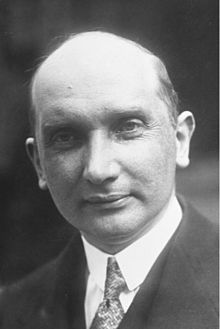August Zaleski
| August Zaleski | |
|---|---|
 |
|
|
President of the Republic of Poland 2nd President of Poland in Exile |
|
|
In office June 9, 1947 – April 7, 1972 |
|
| Prime Minister | Tadeusz Bór-Komorowski, Tadeusz Tomaszewski, Roman Odzierzyński, Jerzy Hryniewski, Stanisław Cat-Mackiewicz, Hugon Hanke, Antoni Pająk, Aleksander Zawisza, Zygmunt Muchniewski |
| Preceded by | Władysław Raczkiewicz |
| Succeeded by | Stanisław Ostrowski |
| Personal details | |
| Born | September 13, 1883 Warsaw, Russian Empire |
| Died | April 7, 1972 (aged 88) London, England |
| Nationality | Polish |
| Political party | None |
August Zaleski (September 13, 1883 – April 7, 1972) was a Polish economist, politician, and diplomat. Twice Minister of Foreign Affairs of the Republic of Poland, he served as the President of Poland within the Polish Government in Exile.
August Zaleski was born in Warsaw on September 13, 1883. In 1901, he was graduated from a gymnasium in Praga and became a librarian for the Krasiński family, but finally moved to London, where he received a master's degree from the London School of Economics. He was unable to return to Poland during World War I and, in 1917, started lecturing in the Polish language in London. About that time he also became interested in freemasonry and became one of the collaborators of the Polish National Committee, the institution that was to become the Polish representative to the Triple Entente. As such, he was one of Roman Dmowski's envoys to assure English politicians that Józef Piłsudski's Polish Legions had sided with the Central Powers in order to combat Russia, not the West.
In 1918, when Poland regained her independence, Zaleski proved to be a skilled diplomat and served at various posts in Polish embassies in Switzerland, Greece, Italy and was one of the Polish envoys to the League of Nations. After the May Coup d'État of 1926 he sided with the camp of Marshal Józef Piłsudski and, until 1932, held the post of minister of foreign affairs in two subsequent governments. Between 1928 and 1935, Zaleski was also a member of the Senate of Poland. At the end of his term, he retired from active politics and became chairman of Bank Handlowy (Commercial Bank), one of the best-known Polish banks of the time. He held that post until the invasion of Poland (1939), when he successfully evacuated his company's assets first to France and then the United Kingdom.
...
Wikipedia
